Home Blog Presentation Ideas How to Give A Compelling Interview Presentation: Tips, Examples and Topic Ideas

How to Give A Compelling Interview Presentation: Tips, Examples and Topic Ideas
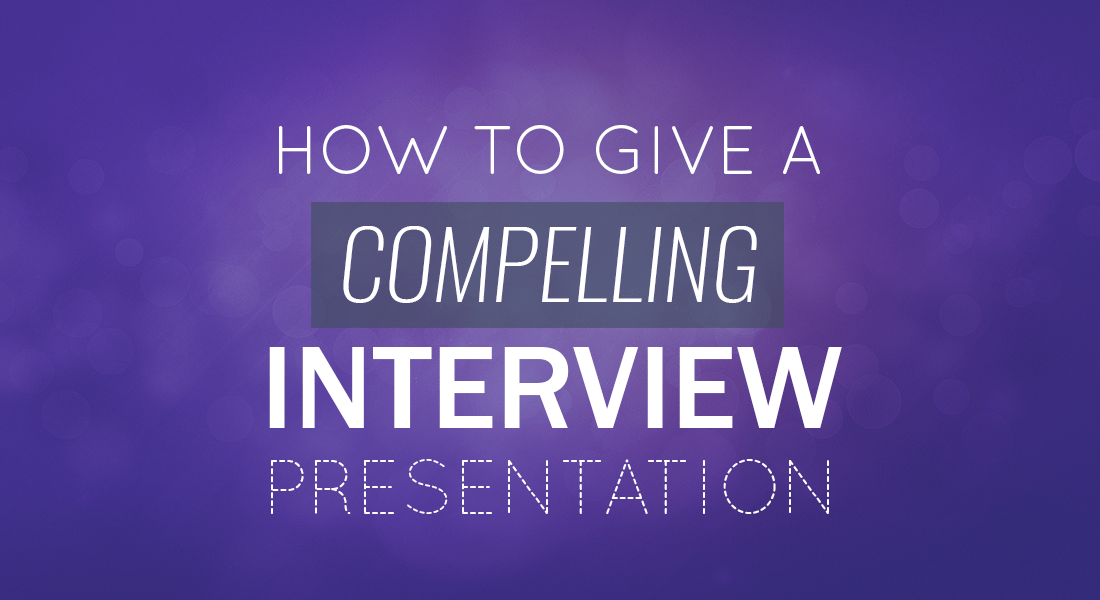
Interview presentations have now become the new norm for most industries. They are popular for sales, marketing, technology, and academic positions. If you have been asked to deliver one for your job interview presentation, prepare to build a strong case for yourself as a candidate.
Giving a general presentation is already daunting. But selling yourself is always the hardest. Spectacular credentials and stellar expertise don’t count much if you cannot present them clearly, which you are expected to do during your interview presentation.
So, let’s prime you up for the challenge. This post is action-packed with job interview PowerPoint presentation examples and will teach you the best way to do a presentation without stressing too much!
Table of Contents
What is an Interview Presentation?
What should an interview presentation look like, how to prepare for a job interview presentation: the basics, define your structure, what slides to include, how to come up with 15-minute interview presentation ideas, how to conclude your interview presentation, how to prepare for an interview: the final tips, what to do at the first interaction with the company elevator pitch for interview, presentation design tips, how to overcome presentation anxiety, tips on maintaining positive body language throughout the presentation, your final act.
An interview presentation, also known as a job interview presentation or interview portfolio, is a formal and structured way for candidates to showcase their skills, qualifications, and suitability for a specific job position during an interview. It goes beyond the typical Q&A format of interviews, allowing candidates to demonstrate their expertise through a prepared presentation. Employers commonly request interview presentations in various industries, such as sales, marketing, technology, academia, and management roles. These presentations serve several important purposes: assessing communication skills, evaluating cultural fit, measuring expertise, analyzing problem-solving skills, and observing presentation skills. While the specific format and requirements of interview presentations vary widely, candidates typically receive guidelines from the employer regarding the topic, duration, and any specific criteria to be addressed. In essence, an interview presentation is an opportunity for candidates to make a compelling case for their candidacy, showcasing their qualifications, experience, and suitability for the job. It requires careful preparation, effective communication, and the ability to engage and persuade the interview panel. A successful interview presentation can significantly enhance a candidate’s chances of securing the desired position.
Think of your interview presentation as a sales pitch.
Your goal is to convince the human resources team that you are the best candidate. The kick here is that you will present to a warm audience – you already impressed them enough with your resume to be called in for an interview. We recommend generating a strategy and presentation based on a 30 60 90 Day Plan .
Employers request interview presentations for a few simple reasons:
- To assess your communication and public speaking skills.
- To understand whether you are the right cultural fit for the company.
- To develop a better sense of how well-versed you are in the domain .
So, your first job is ensuring your presentation fits the criteria. Review the company’s job description again and jot down all the candidate requirements. Take the time to read about their company values and mission. Be proactive and ask precisely what you should cover during your presentation.
Most interview presentations will differ in content and style, but here’s a quick example to give you more context:
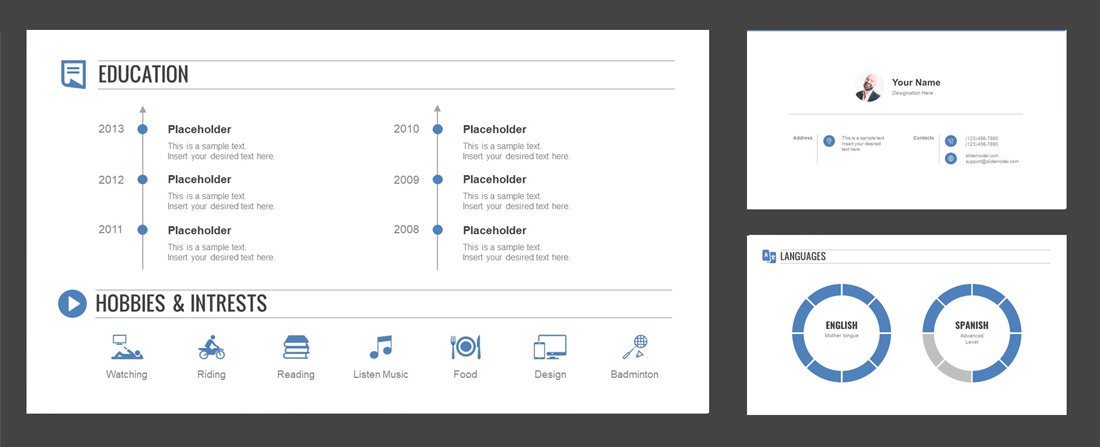
[ Use This Template ]
Before you get elbow-deep in designing that PowerPoint for a job interview presentation, do some scouting and reach out to the HR team with a few questions.
You want your presentation to be on-point and technically accurate, so ask your contact the following:
- How long should an interview presentation be? Fifteen minutes is the golden standard, though some employers may ask to cut it down to just 10 minutes or extend it to 20-25.
- Who exactly will be present? A conversational presentation would undoubtedly be welcomed by your peers and a team leader but may appear too casual for the senior managers or board of directors.
- Does the HR team have a particular agenda in mind? Ask some leading questions to understand what kind of skills/experience they want you to demonstrate. If needed, use a proper agenda slide to include your content.
- What’s the IT setup? Should you bring your laptop? Do you need an adapter to connect to their projector? What kind of presentation software have they installed – PowerPoint, Keynote, Google Slides?
Everyone appreciates clarity.
In fact, 89% of professionals state their ability to communicate with clarity directly impacts their career and income.
Your presentation should flow, not rumble. Make sure that your story is easy to follow and your key message is easy to digest, remember, and pass on. If you want people to retain your main points, opt for the following structure:
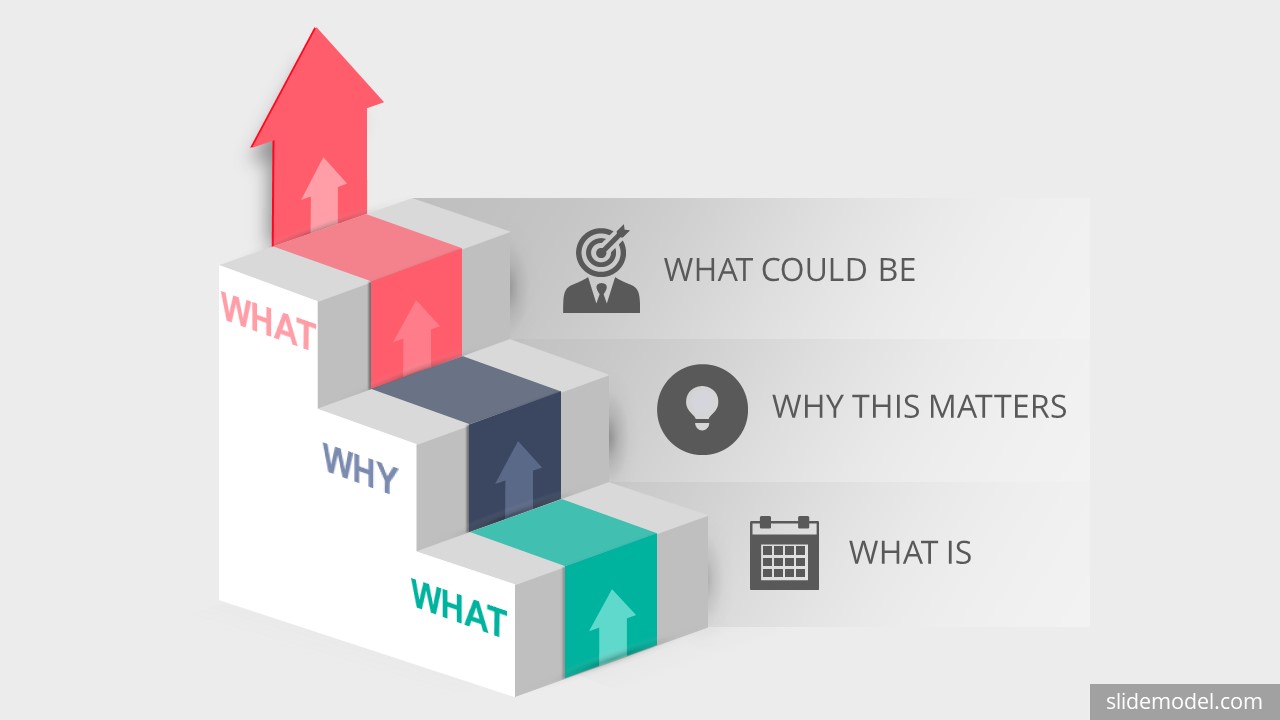
Source: this infographic was created with 3 Steps Editable 3D Ladder Infographic
Here’s an interview presentation example styled in this fashion.
What is: The company’s presence in the Middle East is low. Only 15% of revenues come from the top markets.
Why this matters: The UAE fashion market alone is expected to grow at a CAGR of 21% during the next five years.
What could be: I have helped my previous employer open a flagship store in Dubai, have a lot of industry contacts, and am familiar with the local legislature. Your brand can expect a 17% revenue growth within one year of opening.
You can find even more ideas for designing your presentations in this post .
The choice of slides will largely depend on whether you are asked to talk about yourself or present on some task that you will be required to do as part of your job (e.g., create marketing campaigns).
Most interview presentation templates feature the following slides:
- Opening Slide
- Quick Bio/Personal Summary
- Career Path
- Education timeline
- Key Skills and Expertise
- Case studies/examples of the problems you have solved at your past jobs
- Your vision for your future role.
- What exactly can you bring in as the candidate (we will come back to this one later on!)
Can’t figure out where to start? Check out our AI PowerPoint generator to create an entire interview slide deck in a couple of clicks, or just download a job interview template . Swipe down to learn from the either of the following job interview presentation samples.
Typically, a talent acquisition team will suggest broad interview presentation topics for you. For example, if you are applying for a sales position, they may ask you to develop a sales presentation for some product (real or imaginary).
Some employers will request a short presentation about you or your hobbies to understand whether you are a good “fit” for the team and share the company’s values. Remember this: your audience will be assessing your aptitude for the role, no matter which topic you were given.
In fact, the interviewers at this point don’t care that much about your experience and skills. They want to know how you can apply those to solve the company’s pressing problems – meet sales targets, improve ROI from social media marketing or help them earn more revenue.
Your job is to make an educated guess… predict the most wrenching problem, and pitch your “magic pill” during your interview presentation.
I know what you are thinking – but how do I find the right opportunity/problem to tackle?
Businesses across different industries pretty much struggle with the same generic challenges related to either of the following:
Your topic should clearly address one of these areas and offer a potential roadmap for solving some specific problem within it.
Let’s say that you are applying for a sales role. Clearly, you will want to tackle the “customer audience” set of problems. To refine your idea, ask yourself the following questions:
- Can you think of a new customer segment the company should target? Who are they, what do they want, and how you can help the company reach them?
- Do you have a network or experience to identify and pitch new clients?
- Can you think of new collaboration opportunities the company could use to attract a whole new niche of customers?
So a sample job interview presentation about yourself should include a series of Problem & Solution Slides , showing exactly how you will address that issue if the company hires you.
Here’s another PowerPoint presentation about yourself for job interview example worth using – incorporate a case study slide, showing how you have successfully solved a similar problem for your past employer.
Wrap up your presentation by laying out the key steps the company needs to take. Give an estimate of how much time it will take to tackle the problem, and what changes/investments should be made.
Your conclusion should tell this: “Hire me and I will solve this problem for you in no time!”.
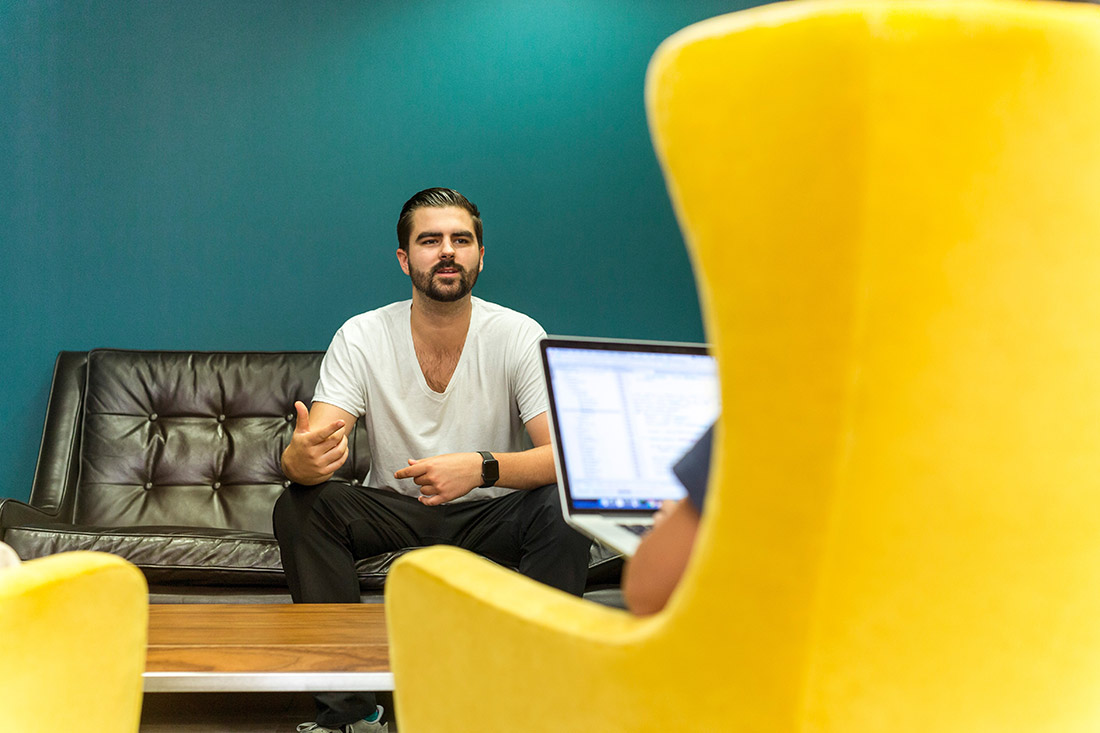
Source: StockSnap
Dial-Up Your Power
Take a deep breath and strike a “power pose” before you enter the room.
According to her research, power posers performed better during interviews and were more likely to get hired. Another study also proved this theory: unaware judges gave major preference to the power-primed applicants. So yes, pep talks do work!
The first 30 Seconds Count The Most
What you do and say in the first 30 seconds will make the most impact. Psychological research shows that listeners form opinions about your personality and intelligence in the first 30 seconds of the interview. So be sure to start with a compelling opening, framing exactly how you want to be perceived.
Try To Appear Similar to the Interviewer
Lauren Rivera, a professor from Kellogg School, came to the conclusion that interviewers tend to hire “people like them” .
Even the top human resource management folks fall for this bias and tend to base their evaluations on how similar a candidate is to them, instead of trying to decide whether the person’s skill set is ideal for the position. So to be liked, you will have to act relatable.
Back up your statements with facts
To deliver a presentation with a bang, you can make use of pre-analyzed facts to support your hypothesis. Make sure to do your homework, study the company and its competitive landscape, and do the professional work you would have done as a member of the company crew. At some point in your interview presentation, you go “off the script”, and pull out a bunch of documents, supporting your statements.

For example, you can give away a quick plan indicating a number of things the employer could do today to save money, even if they don’t hire you. Make sure to be meticulous; your work will speak for you. But giving away this work will show the employer your commitment, skills, and focus.
And that’s exactly how to make your job interview presentation stand out. Most candidates just ramble about their skills and past career moves. You bring specificity and proof to the platter, showing exactly what makes you a great hire fair and square.
Within a selection process, there are many interactions (interviews and dynamics) that you must successfully complete in order to be the next selected candidate. One of your objectives in this first interaction should be to generate a great first impression in the company. For this, we recommend using the Elevator Pitch for Interview technique.
The Elevator Pitch for Interview will allow you to present yourself in a solid and professional way in less than 60 seconds, in order to generate an outstanding first impression.
What is an Elevator Pitch for an Interview?
The Elevator Pitch is a condensed speech about yourself that aims to generate engagement in no more than 60 seconds. Entrepreneurs widely use this type of speech to persuade investors and job seekers in job interviews. Your Elevator Pitch for the Interview will generate a great first impression to the employer and be better positioned than other candidates. If your goal is to make a convincing presentation in a job interview, your Elevator Pitch needs to be well crafted.
How to Make an Elevator Pitch for an Interview
There are many ways and tips to make an excellent Elevator Pitch for a job interview. This section provides you with essential advice to make your interview more convincing.
Identify your target
You need to know to whom you are presenting yourself. Is it a recruiter? or an executive?. Your Elevator Pitch will change depending on the receiver.
Comprehend the needs of the hiring company
Make an advanced study about the search requirements for the job position. Identify your strengths. Highlight them. Demonstrate your experience. Identify your weaknesses. Show that you have a profile that seeks constant improvement
Create a clear, concise, and truthful Elevator Pitch
This point is critical. Your Elevator Pitch must be clear, concise, genuine, and impactful. Go from less to more. Generate a real hook in your audience. Try not to go off-topic or talk too much, and be brief in everything you want to say.
Speak naturally and confidently
If you can speak fluently and naturally, you can show a confident profile. Show you know what you are talking about and what you want.
Elevator Pitch Example for Job Seekers
This section illustrates an Elevator Pitch Example targeted to Recruiters. It will help you put together your own.
“My name is [NAME]. After graduating with a degree in Business Administration, I have spent the last five years accumulating professional experience as a Project Assistant and Project Manager. I have successfully managed intangible products’ planning, strategy, and launch these past few years. I was excited to learn about this opportunity in Big Data – I’ve always been passionate about how technology and the use of information can greatly improve the way we live. I would love the opportunity to bring my project management and leadership skills to this position.”
Ways to avoid common mistakes in your Elevator Pitch
Keep in mind the following points to avoid making mistakes in your Elevator Pitch for an Interview.
Don’t hurry to make your Elevator Pitch
The Elevator Pitch lasts approximately 60 seconds. Do it on your own time and naturally, as long as you make it clear and concise.
Do not always use the same Elevator Pitch for all cases
One recommendation is not to repeat the same Elevator Pitch in all your interviews. Make changes. Try new options and ways of saying the information. Try different versions and check with your experience which generates more engagement and persuasion.
Make it easy to understand
Articulate your pitch as a story. Think that the person in front of you does not know you and is interested in learning more about your profile. Don’t make your Elevator Pitch challenging to appear more sophisticated. Simply generate a clear and easy-to-understand narrative, where all the data you tell is factual and verifiable.
Don’t forget to practice it
Practice is the key to success. Your Elevator Pitch for Interview will become more professional, convincing, and natural with practice.
How to End an Elevator Pitch?
An essential aspect of ending an Elevator Pitch for an Interview is demonstrating interest and passion for the position. You have already presented yourself and established that you have the necessary background for the job. Closing with phrases revealing passion and attitude will help reinforce your pitch.
We recommend you use expressions such as:
“I have always been interested and curious about the area in which the company operates, and it would be a great challenge for me to be able to perform in this position.”
“I have been interested in moving into your company for a while, and I love what your team is doing in IT.”
“I would like to advance my career with an employer with the same values. I know that thanks to my profile and experience, I can make excellent contributions to your company.”
Keep It Visual: Use visuals like images, graphs, and charts to convey your points effectively. Visuals can make complex information more accessible and engaging. Consistency Matters: Maintain a consistent design throughout your presentation. Use the same fonts, color schemes, and formatting to create a cohesive look. Practice Timing: Be mindful of the allotted time for your presentation. Practice to ensure you can comfortably cover your content within the time limit. Engage the Audience: Incorporate elements that engage the audience, such as questions, anecdotes, or real-world examples. Interaction keeps the interview panel interested. Use White Space: Avoid cluttered slides. Use white space to create a clean and uncluttered design that enhances readability.
Presenting during a job interview can be nerve-wracking. Here are some strategies to overcome presentation anxiety:
- Practice: Practice your presentation multiple times, ideally in front of a friend or mentor. The more you rehearse, the more confident you’ll become.
- Visualization: Visualize yourself by giving a successful presentation. Imagine yourself speaking confidently and engaging the audience.
- Breathing Techniques: Deep breathing can help calm nerves. Take slow, deep breaths before and during your presentation to reduce anxiety.
- Positive Self-Talk: Replace negative thoughts with positive affirmations. Remind yourself of your qualifications and the value you bring to the role.
- Focus on the Message: Concentrate on delivering your message rather than dwelling on your anxiety. Remember that the interviewers want to learn about your skills and experiences.
- Arrive Early: Arrive at the interview location early. This gives you time to get comfortable with the environment and set up any technical equipment you use.
Maintain Good Posture: Stand or sit up straight with your shoulders back. Good posture conveys confidence and attentiveness. Make Eye Contact: Establish and maintain eye contact with your audience to show confidence and engagement. Use Open Gestures: Employ open gestures, like open palms and expansive arm movements, to convey enthusiasm and openness. Smile and Show Enthusiasm: Genuine smiles and enthusiastic facial expressions demonstrate passion and eagerness. Control Nervous Habits: Be mindful of nervous habits like tapping or fidgeting, which can distract your audience and convey anxiety.
Stop fretting and start prepping for your interview presentation. You now have all the nitty-gritty presentation tips to ace that interview. If you are feeling overwhelmed with the design part, browse our extensive gallery of PowerPoint templates and cherry-pick specific elements ( diagrams , shapes , and data charts ) to give your interview presentation the top visual appeal.
Here you can see some 100% editable templates available on SlideModel that could be useful for preparing an interview presentation.
1. Versatile Self-Introduction PowerPoint Template
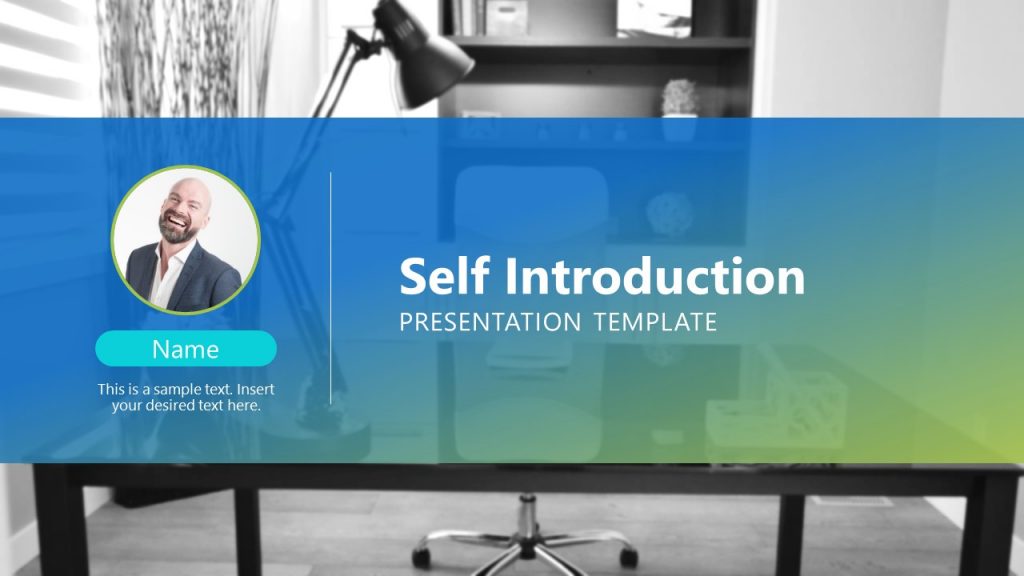
Use This Template
2. Professional Curriculum Vitae PowerPoint Template

This a sample of PowerPoint presentation template that you can use to present a curriculum and prepare for a job interview presentation. The PPT template is compatible with PowerPoint but also with Google Slides.
3. Modern 1-Page Resume Template for PowerPoint
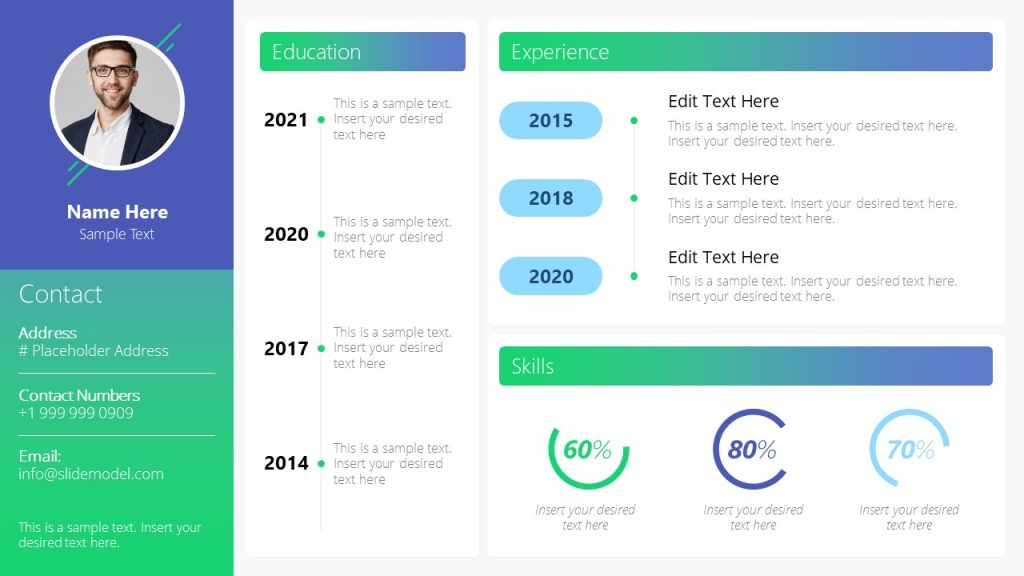

4. Multi-Slide Resume PowerPoint Template
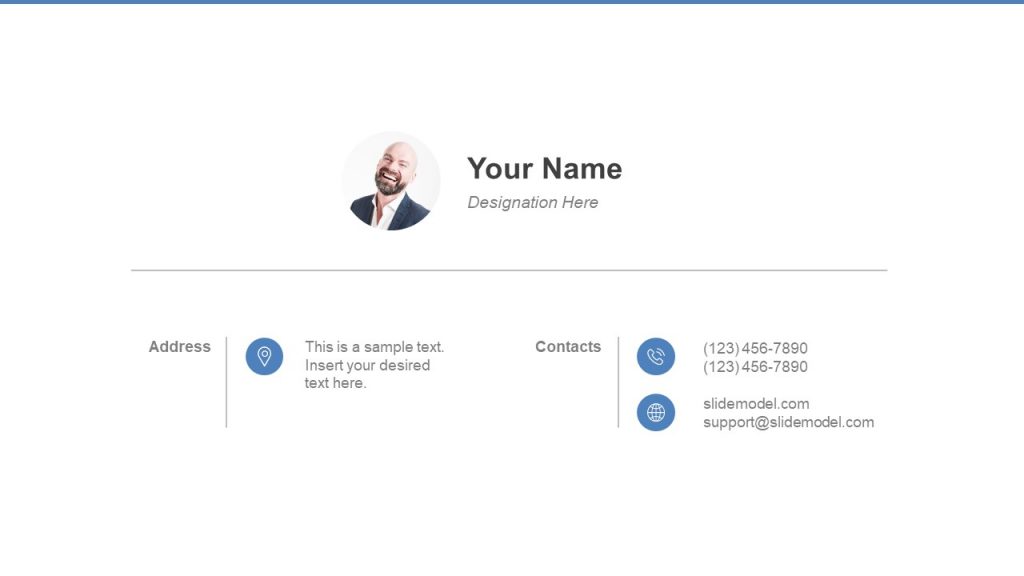
Like this article? Please share
HR, Human Resources, Interview, Job, Resume Filed under Presentation Ideas
Related Articles
Filed under Business • October 1st, 2024
How to Set Presentation Skills on a Resume
Discover the best ways to highlight your presentation skills on a resume, helping you stand out as a strong communicator and leader during job applications.
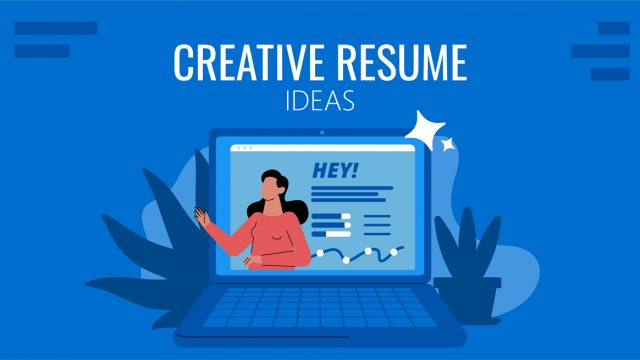
Filed under Design • July 19th, 2024
Creative Resume Ideas with Examples
This blog post presents some creative resume ideas that can be used for inspiration.
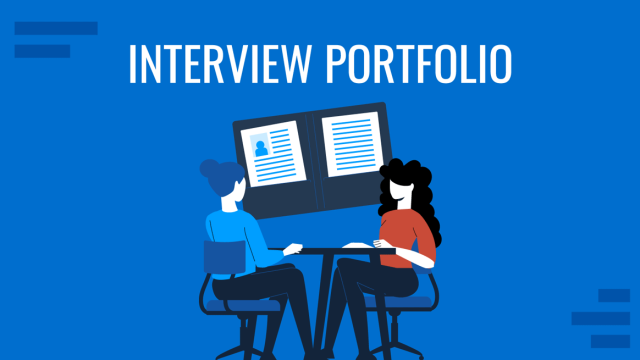
Filed under Business • April 17th, 2024
How To Make an Interview Portfolio (Examples + Templates)
Transform your job seeking experience into a smooth process by learning how to make an interview portfolio. Guide + Examples here.
One Response to “How to Give A Compelling Interview Presentation: Tips, Examples and Topic Ideas”
Leave a reply.

Ace the Presentation
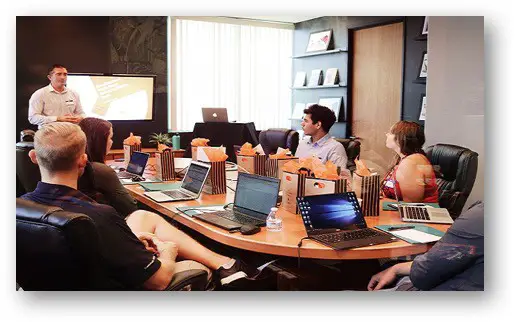
55 Job Interview Presentation Topics
Job interview Presentations can give some butterflies in the stomach. After all, it might be the conversation that will decide your tomorrow. Things can get more serious if you are required to make a presentation as part of the interview.
The good news is that shouldn’t be the end of the world. That nightmare can turn into a dream with prior preparation and research.
There is a growing trend in some companies when recruiting, where they ask their interviewee to give a presentation as part of the interview process, and they either give the topic to them or ask them to come up with one.
The person applying for the job can use the time before the interview presentation date as an advantage to research and prepare for acing the presentation.
When choosing the topic, one thing to have in mind is the position to be filled, which will help when deciding what to present to the interviewers, as the topic should be related to the position. Otherwise, it will deviate everyone’s focus.
After quick and thorough research, it is possible to come up with basic information about the company and position offered to choose the topic for the presentation.
I have had a lot of success in preparing my job presentations or case study presentations and landing the job offer, it comes natural to me, but also, I take a lot of time to do research and structure the presentations in a compelling and exciting way. It takes time to master that skill, but don’t despair, because you can get help with your PowerPoint presentations from experts. Contact the guys at Custom Writings , they’re a presentation writing service which will handle your project on any topic.
Having said all that, let’s look at 55 ideas from 11 topics (5 for each) for a job interview presentation.
- Arts and Culture
- Sustainability
- Human resources
Each one of the topics above can be a broad theme and be related to anything and everything, though they can be focused on specifics of a job description, for example, to meet the expectations of the interviewers and judge how good your research about the topic and the position is.
Related Posts:
10 Dos and Don’ts for Job Interview Presentations
What Makes a GOOD Job Interview Presentation? 7 Key Aspects
8 Valuable Tips for Unemployed Fresh Graduates (Or anyone really)
9 Tips for Delivering a Stellar Case Interview Presentation
11 Great topics for a job interview presentation
1. arts and culture.
Arts and culture involve many aspects of society, such as music, movies, performances, TV, literature, and so on.
When presenting a topic about Arts and Culture, the audience will probably be familiarized with it. Again, research will be crucial here. It is absolutely important that the presenter knows what he/she is saying. Thorough research will get that job done.
Another aspect to be taken into account is that since people are probably already familiar with the topic, the presenter can adopt a conversational and more personal approach, of course, not forgetting the professional touch. After all, the presentation is part of a job interview.
Arts and Culture Job Interview Presentation Topics:
- How to get more people to read books?
- Learning foreign languages as a preventive measure when traveling.
- How important are museums for local communities?
- Are movies harmful to child education?
- How to improve music’s efficacy as a language learning tool?
2. Business
Topics in the business section will be focused on people and positions in the corporate world, leadership, management, human relations, communications, and similar subjects. This subject might need more research, and the data presented will have to be exact as those should be assumed to impact aspects of a real-time workplace.
The interviewers may see in a presentation an opportunity to find new ideas for issues they currently face in the company or even new working approaches to be applied. Serious research and real-time data presented in an interview can really help the candidate get picked for a position.
Business Job Interview Presentation Topics:
- How to make the workplace learning-friendly?
- Ways to make remote collaboration work.
- Improving communication between co-workers.
- How to measure the ROI in all Marketing campaigns?
- What are the best strategies to improve Customer Experience and loyalty?
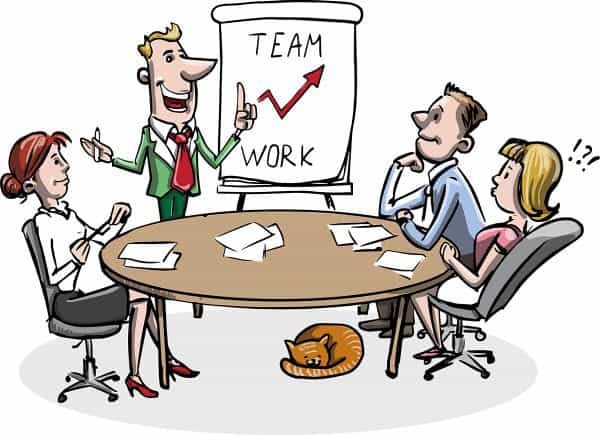
3. Education
Education is a subject that interests many, if not everyone. When being dealt with, one thing to keep in mind is that a quality education today will shape the future of a country and the world, what can be improved and what can change to make education better.
A lot has been said about Educational systems. All those opinions should be used to understand perhaps what is missing and see if things can change.
Education is a subject that can give a lot of options for research and problem-solving. It should be seen as an advantage to have this subject on hand.
Education Job Interview Presentation Topics:
- The impact of a parent’s engagement in school life.
- How do curriculum changes affect the process of learning?
- Homeschooling: is it better than the traditional education system?
- Does remote education work? How to Improve it?
- Secular Education: Obsolete?
This is a subject that also interests many, and if well presented, can engage the audience right away. People are constantly thinking about ethics, and how something that seems good for a group of people can look bad to others. It can, at times, be intriguing too.
If you bring in the right questions and get people to wonder, you will definitely engage whoever is listening.
That is an opportunity to call the attention of interviewers to research results and interesting finds about ethics. Since ethics involve some critical thinking, it creates an opportunity to showcase some of it to the audience too.
Ethics Job Interview Presentation Topics:
- Should cities have cameras in the streets?
- 3-D printing and development of human organs.
- Death penalty: does it solve the problem?
- Is taking gifts from your business partners anti-ethical?
- Is love in the Workplace forbidden? Can we control our emotions?
Science is also a broad topic related to researching and bringing results in certain areas. Trying to understand the world, its creation, and how to make it better through analysis hypothesis and experiments with elements found in nature.
Science topics to be chosen will be broad and involve every aspect of life to be known.
Science Job Interview Presentation Topics:
- How was the planet created?
- Immortality: does it align with nature’s ways of working?
- What is “Dark Matter” and why is it important?
- Is climate change going to render our planet inhospitable in 50 years?
- How can we save the World from the next global pandemic?
6. Sustainability
The subject of sustainability is a very interesting topic that has gained a lot of attention recently due to proposed changes to help decrease the effects of global warming. It should not be only important at certain times though.
It should be adopted forever, as that is the only way to co-exist with the biosphere to both meet our needs and not jeopardize nature, and this way, future generations can enjoy a planet like the one we found and even better. So this subject can proportionate a broad choice of topics as well.
Sustainability Job Interview Presentation Topics:
- How to adopt sustainable approaches in our daily lives?
- What are ways to promote a sustainable lifestyle among students?
- To what extent are catering and food products certified as organic or fair trade food?
- Fossil fuels vs Renewable Energy: How sustainable it is to use only one of them?
- Donations to poor countries and its impact on future generations
7. Technology
When the subject is technology, the thing that comes to mind for almost everyone is the digital era. A lot has changed and is still changing; many sectors adopt these changes in their environment and would be interested in knowing more about the so-called technology and how it would help them in the digital era.
Technology Job Interview Presentation Topics:
- The impact of social media in the development of children.
- Is 5G more important than people’s health?
- Is AI necessarily an enemy for humanity?
- How can we use Data Analytics for Improving Decision Making?
- Is Zoom really an unsafe collaboration and video calling tool?
Society is another subject that will resonate with everyone, and that can be used as an advantage as there can be many topics to choose from. How people relate within a community and how those relations are seen by the ones in it.
It is crucial to improve relations in society, as the individuals will constantly interact with one another.
Society Job Interview Presentation Topics:
- Are we doing enough to end poverty?
- Volunteering in your community.
- Race relations need to be improved.
- How to improve malnutrition in Africa?
- Are the Indigenous people being treated fairly?
9. Human resources
The personnel responsible for recruiting people capable of doing the required job; training the recruited people; promoting a good working environment, and monitor performance.
This subject will be narrowed to aspects of companies. These will need people capable of selecting from a broad group, the ones that fit with the job description.
Human Resources Job Interview Presentation Topics:
- Creating a stress-free environment.
- Balancing HR Strategies with business growth.
- Harassment of women in the workplace.
- Career Progression Plans
- Effective Succession Planning
10. Nutrition
A lot of people only think about food upon hearing the word nutrition. Well, they do not deviate from the subject. Though how and what people eat will influence their body, mind, and spirit, there are researches that prove that food, for example, influences the mood of a person.
So a company dealing with food or health might want a candidate to present the results of research in this area. Influences of nutrition in other areas of life would then be attractive to interviewers operating in this area.
Nutrition Job Interview Presentation Topics:
- Habits of food purchases and association with diet.
- Practice and application of knowledge by nutrition students.
- Childhood Obesity: Possible causes and solutions.
- Organic food vs. Processed Food: How to keep the balance?
- What is the most effective way of reducing weight beyond your 30s?
11. Logistics
The process involving the organization and transportation of goods from one point to another is what logistics comprise. These goods need to be safely handled during transportation and storage until handed to customers.
Companies should focus on collaboration between the transport providers, the buyers, and the vendors in order to have a good final result.
Logistics Job Interview Presentation Topics:
- Transportation as a Vital Aspect of Logistics and Supply Chain Management.
- Radio Frequency Identification: the Use of a Minuscule Computer Chip to Track the Product.
- Recruiting quality drivers for your trucking company.
- Internation ship cargo tracking
- How to expedite the Customs Clearance process?

In conclusion,
There is a broad range of topics to be chosen or, in some cases, given. All one has to do is dedicate some time before the interview to research the topic and develop some good ideas and facts to ensure the interviewers get interested and engaged in the presentation.
A reliable and facts-rich presentation might save the candidate a spot on the company. It can all be resumed to good research, one that goes to the roots of an issue and brings answers and solutions to be taken into consideration.
Similar Posts

Here’s a Winning Motivation Letter Guide
Also known as a cover letter, the motivation letter is widely used by those who intend to apply for a job vacancy or at a university abroad. Writing an excellent motivational letter without spelling errors and objectives is not an easy task; many candidates worry at this point. What must it contain? This article will…

8 Effective Ways to Give Constructive Criticism at Work
Some people don’t respond well to criticism. This is mainly because we prefer to be praised for our strengths and not criticized for our weaknesses. In this context, the question arises: how do we make constructive criticism without discouraging the person? This question is one of many that will be answered during this article, right…

5 Reasons why you’re never called for a Job Interview
Who never wanted to know why they’re never called for a job interview, right? The vacancy ad is there, and you make the resume, send it and spend an eternity waiting for a response that never happens. If the situation is recurring, it is essential to reflect on why companies are not feeling interested in…

Farewell Speech: The 8-Steps Guide for a Memorable One
Bidding farewell to your coworkers can be a bitter-sweet experience, especially if you’re retiring or you got a big promotion in a bigger city. Even if it is not official to give a farewell speech, it is only ethical you say some few words of goodbyes when presented with a farewell cake or card by…

First Job: 9 Tips that will help you Land that Job
The job market is increasingly competitive, with more factors being required, and this dispute is even greater for those who have never worked and are looking for their first job. Nervousness, anxiety, and insecurity (due to lack of experience) make the search for the ideal job even more outstanding, hindering the candidate at the time…

7 Interpersonal Skills to Stand Out at Work
We live in a highly competitive society. Becoming better at your craft or knowing how to excel at work, maintain employment or get a job is a major necessity. Therefore, having a career strategy is vital for those who want to be successful professionals in their field. By professional career development strategy, I don’t just…

IMAGES
VIDEO